|
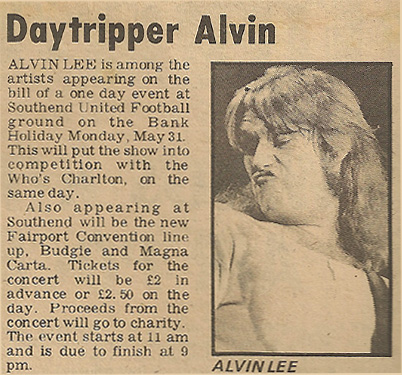
RECORD MIRROR - April 10, 1976
| New Musical Express April
17, 1976
Alvin
Lee’s Band In Concerts
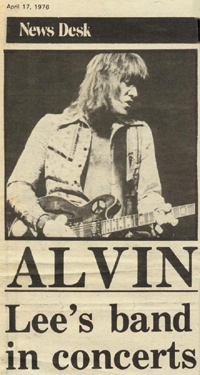
News
Desk:
Alvin
Lee is going out on the road again, opening later this month,
and he has completely re-vamped the line up of his backing
band – although it will still be going under his standard
billing of Alvin Lee & Company. The British dates will
serve as a preview to the outfits new album, which is due out
at the end of next month.
With
Lee featured on lead guitar and vocals, he is joined in his
new look outfit by highly respected keyboard player Tim
Hinkley, who has previously worked with at least a dozen
different name bands; drummer Bryson Graham, best remembered
for his work with Spooky Tooth; and spells with
Savoy Brown and Blodwyn Pig.
A
spokesman commented: “This is not a question of the old band
having split or been sacked. Ever since he started working as
a soloist, his backing band has always been flexible. He
simply signs up musicians on a short-term basis, to cope with
what ever bookings he has in hand at any particular time. It
never was a permanent band”.
The
new Alvin Lee album is titled “Sagitar” and is scheduled
for May 28 release by Chrysalis. It will be preceded, in about
three weeks time by a single called “Sea Of Heartbreak” a
revival of a former hit by country artists Don Gibson.
First
dates confirmed for the band are Cardiff University (30)
Birmingham Odeon (May 1), Bristol University (7), Ipswich
Gaumont (8), York University (15) and the open air concert at
the Southend United Football Ground on Spring Bank Holiday May
(31).
It
is understood that a few more dates and venues have still to
be finalized, and they may well include a major London
performance. Lee’s appearance in the Southend gig, plans for
which were revealed by New Musical Express last week, is still
subject to confirmation. Said the the spokesman: “Alvin
hasn’t yet signed a contract to take part in this event, but
it is 95 percent certain that he will do so, as he likes the
idea of the concert and the charity it is benefiting.
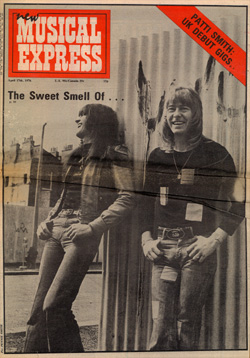 |
|
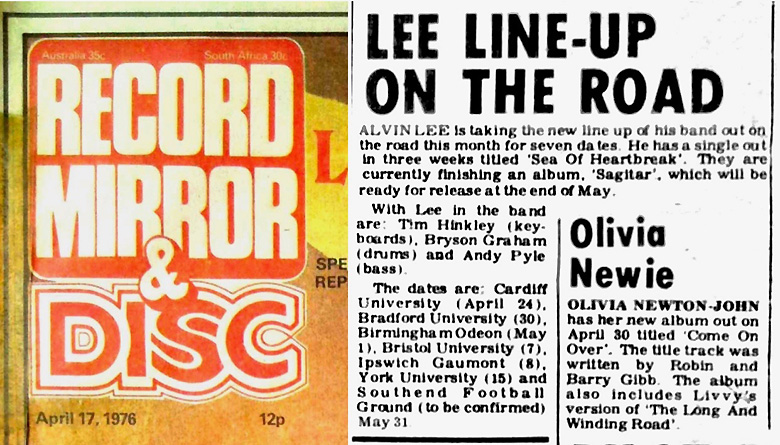
Record Mirror – April 17, 1976

Alvin Lee is taking
the new line-up of his band out on the road this month for
seven dates. He has a single out in
three weeks titled, “Sea Of Heartbreak”. They are currently
finishing an album, “Sagitar”, which will be ready for release
at the end of May.
With Lee in the band are: Tim Hinkley
(Keyboards), Bryson Graham (Drums) and Andy Pyle (Bass).
The dates are: Cardiff University (April 24), Bradford
University (30), Birmingham Odeon (May 1st) Bristol
University (7), Ipswich Gaumont (8), York University (15) and
Southend Football Ground (to be confirmed) May 31st.
|
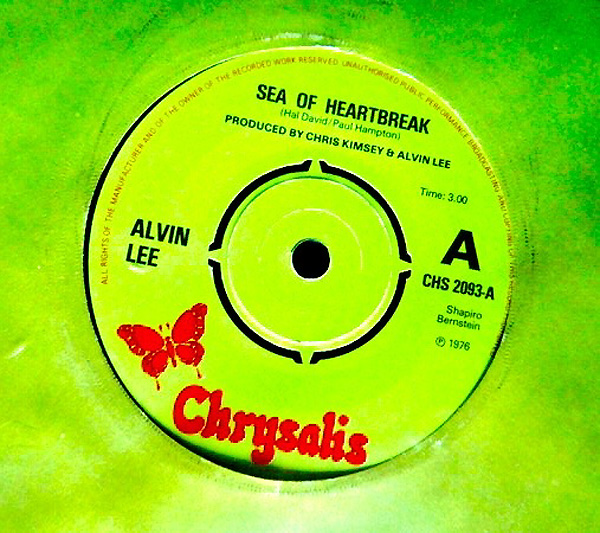
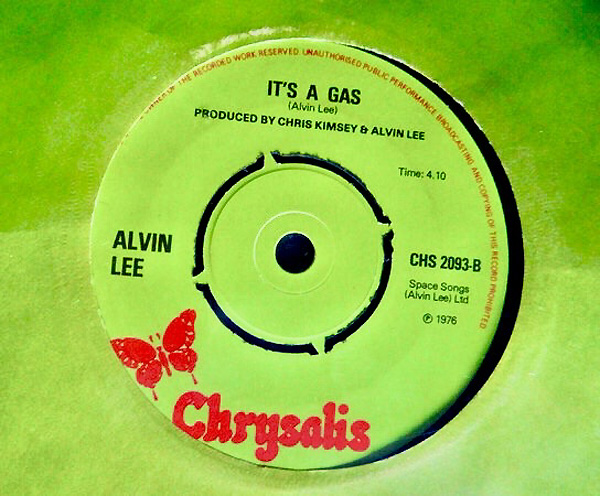
|
Alvin Lee Band - Tour Dates 1976
April 24, 1976 –
Saturday, Cardiff University, England
April 30, 1976 – University of Bradford, England
May 1, 1976 – Odeon, Birmingham, England
May 7, 1976 – University of Bristol, England
May 8, 1976 – Ipswich, Gaumont, England
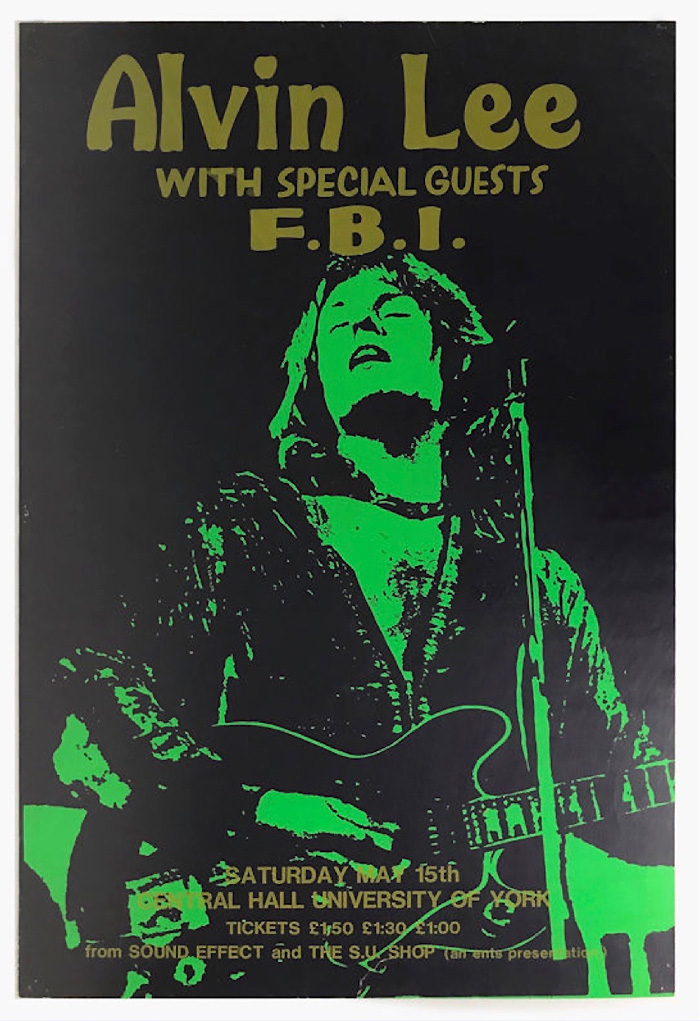
May 15, 1976 –
Concert Ad, with F.B.I. - University of York, England
May 19, 1976 – Queensway Hall in Dunstable, England
May 22, 1976 – Leicester
De Montfort Polytechnic – University, England
May 23, 1976 – Roundhouse – Chalk Farm in London, England
May 31, 1976 – Open Air Concert in Southend United Football
Ground, England
June 6, 1976 – Sunrise Festival in Offenburg, Germany
June 13, 1976
(Friday) – Midnight Special - A ten minute unreleased
song, Ain’t Nothin´ Shaken´ (but the leaves on the tree) and The Devil’s Screaming
|
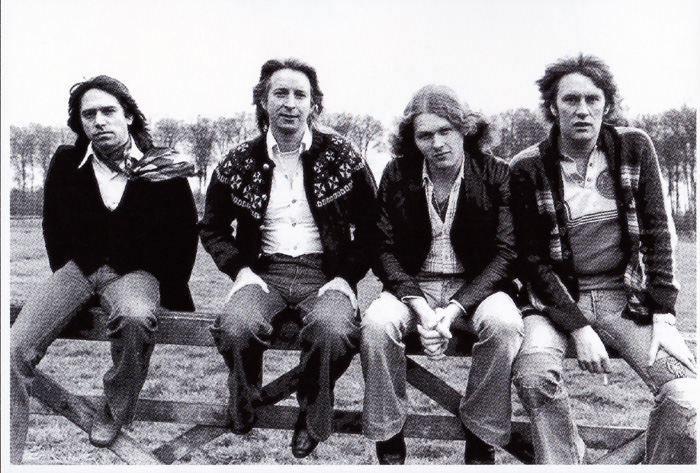
Alvin Lee Band
left to right:
Tim Hinkley (keyb), Andy Pyle (bass),
Bryson Graham (dr), Alvin
|
SOUNDS May 1, 1976

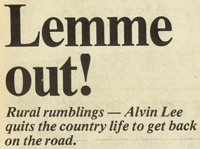
AT
3PM, Alvin Lee, benevolent despot, was still asleep – he hadn’t
gone to bed until 9:30 am – so it seemed a good excuse to take the
obligatory tour of the grounds.
|
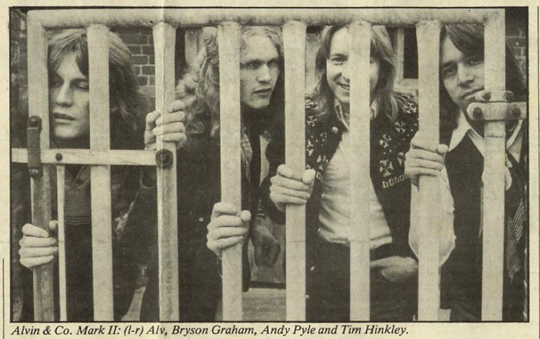
|
The onions were coming up nicely in
the expansive vegetable garden and the grape vines being sprayed by
a gardener in one of the many greenhouses looked well established.
The geraniums also seemed to be doing well.
Across
the fields, where the verdant green of spring battled for attention
with the shrill cries of cocky sparrows and jaunty finches, the
chimney smoke rose from the cottages of Alvin’s tenant farmers.
Their welfare is Alvin’s concern. It’s a hard life, rock and
roll despotism.
Within
the manor, the lord had risen and was reviving his consciousness
with tea. Around him staggered some of his band and co-producer
Chris Kimsey. The latter, with bassist Andy Pyle, had just completed
thirty hours in the studio, emerging with bass track to “Friday
The 13th”, a potential song for Alvin’s new album
called “Rocket Fuel”.
Alvin
turned the discussion of the track to his publicist. “I’ve got a
story for you. We’ve tried to record this track on each of the
last four albums, but every time something happens that makes it
impossible. So when we did it this time we called in an exorcist”.
“Is that so?” “Yep.” Alvin looked pleased. “It’s not
true, but it’s a good story” Retiring to the listening room, Mr.
Kimsey threaded the tape in question onto the Revox. Fresh from
producingPeter Frampton’s last two extravaganzas, his presence was
for his ability to obtain good vocals and keep Alvin
“If-it’s-not-right-in-three takes-forget-about-it”. Lee at the
post until it was perfect. It’s this attention to perfection that
caused him to produce “FBI’s” album, which in turnhas earned
him the job for Kokomo’s next outing.
The
assembled lounged amongst the comfy floor cushions as four Tannoy
Malorcans blasted “Friday The 13th”. The bass bounded
and leaped like a steamroller in heat while a flight of Alvin Lee
guitars cruised in tight formation immediately overhead. Every so
often was an excellent imitation of someone ripping the strings off
an innocent instrument at full amplification. This track was said to
be indicative of the dirtier side of Alvin Lee and Company Mark
2’s burgeoning output, a brace of numbers that will stand up on
stage. Mr. Lee, needing a deadline as impetus – after all, as part
of the Legendary Gits with Boz, Ian Wallace, Tim Hinkley and Mel
Collins, he had done nothing for a year except record every weekend,
precisely because there was no motivation to meet the public- had
live dates arranged and a record release date before a band had been
assembled. Oh, there was the odd person, but auditions and selection
was required, until, with an ensemble assembled four weeks ago,
rehearsals and tapings could happen simultaneously in the
barn-shaped studio.
But
Mr. Lee. Playing? Going on the road? “It’s a physical need.
I’m getting bored with sitting here, I need to see the M1 again,
the Blue Boar. It’ll keep us off the streets”. Are we to
consider this a permanent aggregation?
“It’s quite possible. It depends on who falls over first”.
The
plan as envisioned, is to just keep extending gigs beyond the
initial tour, playing three or four nights a week, keeping the hand
in. An American tour is scheduled for the autumn. The difference
between this “and Company” and the first such was that the
latter was very quickly gathered on a musical basis, regardless of
personality. It immediately split into about three groups. Mark 2
has been assembled by the opposite process. Mark 1, was also an
experiment in directions unfamiliar to Alvin, “which weren’t
really up my street. “But the journey of being a musician is to
take up different paths and explore them. We just got to a point
where I was playing out of my depth. This group is much more basic,
heavy R & B based. I think there’s a tendency to discount what
you do best because it’s easiest”.
The
group had moved to the TV room. The sun steamed through the
mullioned windows, playing across the wood panelling and the 50
video cassettes littering the floor in front of the television.
Outside an open window, finches chattered as they attacked the
suspended bag of suet. A breeze rustled the turf of the croquet lawn.
The leaves on the trees scraped together. It was a hard life, in the
country. ----------
By John Ingham
|
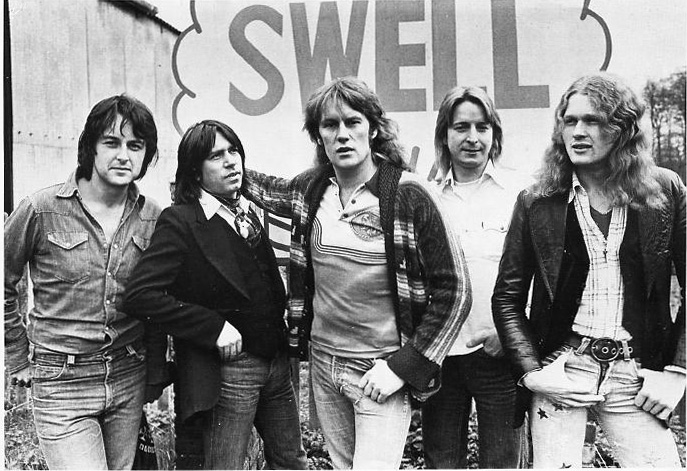
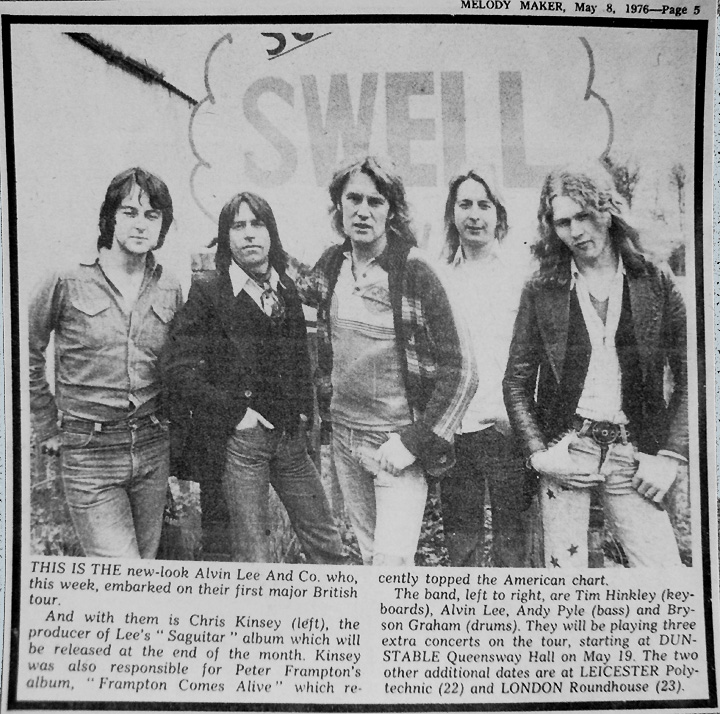
Many Thanks to Claudia Staehr (from Herb
Staehr's Collection)
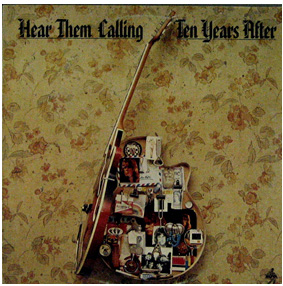
Another "Best Of" Collection by NOVA Records
| 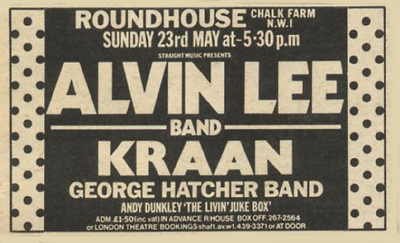
Alvin
Lee At London’s Roundhouse 1976
Of
course everyone knew it was going to happen. By the time
the opening band had finished their set at London’s
famous Roundhouse (the famous locomotive turn around
point) on Sunday afternoon, the fact that Jeff Beck was
going to make an unadvertised guest appearance was a
completely open secret. Exactly with whom he was to play
was less well known, so when ex-Mahavishnu Orchestra
keyboard man Jan Hammer walked on with the rest of his
band, including Steve Kindler, who played violin on
Hammer’s last album, with Fernando Saunders, bass, and
Tony Smith, drums, it looked like we were going to
witness a real summit meeting.
While
it wasn’t quite all that, as it turned out, but it
will do to be going on stage with.
After
a powerful opening with “Country and Eastern Music”,
off his album with Jerry Goodman, Hammer called on “a
guest guitarist who will join us right now” and Jeff
Beck walked onto a storm of applause. They all then
swung right into “It Doesn’t Really Matter” from
Jeff’s own “Blow By Blow” album, and it became
perfectly clear, that this was not going to be any
ordinary meeting of the minds. For the blend of two
apparently disparate styles – Hammer’s cerebral
“Funk” and Jeff’s “Blues Tinged Note Bending”,
has enormous potential. But to be totally honest here,
the full potential of what could’ve been, wasn’t
entirely realized on this occasion.
Jeff
Beck seemed somewhat understated and uncomfortable in
his new role as a guitarist in the band. Even if he was
set up specially as a featured soloist – which
wasn’t a role that he has played since the break up of
the Yardbirds. Also, with the Hammer material he often
seemed merely to be duplicating Kindler’s violin lines.
Hammer
on the other hand, really seemed to be getting off on
Jeff’s presence. They were a hard act to follow for
sure, and to be fair to the German band Kraan, who were
the main support group, they did their very best. Forget
everything that you’ve heard about German Rock Bands
so far, that they are difficult, introverted,
philosophical stuff, high on electronics and low when it
comes to body rhythms – because Kraan aren’t
anything like that stereotype at all. What they are is
funky and exciting, although sadly, it didn’t come
across too well on Sunday.
That
left us with Alvin Lee, who must have had mixed feelings
about his surprise guest. Alvin had two alternatives in
which to choose. First, he could’ve pounded the
opposition into the ground with pile-driving, heavy
metal guitar work, along with five million verses of
“I’m Going Home” just like in the Woodstock
movie; or, he could show us just how tasty he could be
under extreme pressure. Wisely, for my money, Alvin
choose the latter option. But, though comparisons would
be odious, they are also inevitable.
What
Alvin doesn’t have, is Jeff’s melodic flair and
surprisingly he didn’t throw his guitar (axe) around
as much (as usual)But he acquitted himself reasonably
well under the circumstances.
Article written by Karl Dallas
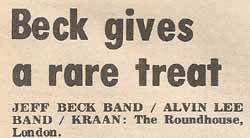
Record Mirror
Magazine – “Beck Gives A Rare Treat”
May 29, 1976 –
Jeff Beck Band / Alvin Lee Band / KRAAN
At The
Roundhouse, London
The rumour was
going round, that the legendary Mr. Beck was to put in an
appearance at Chalk Farm on Sunday. By that afternoon, the
whisper had become a shout, and it was no surprise when
the Jeff Beck Band was announced.
The surprise came with
the sound they came up with – and what a band: bass,
drums, keyboards, electric violin. How does Jeff Beck fit
into that? Very well really, he has not altered so
drastically, just changed his surroundings to give him
some fresh scope.
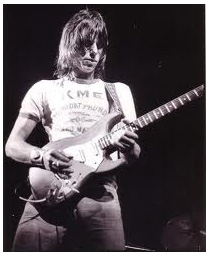
And if it sounded a bit like the
Mahavishnu Orchestra at times, it can have been due to the
fact that the man behind all those keys was Jan Hammer.
The combination of forces is a rare test.
The concert also
marked the return of Alvin Lee after a lengthy
adjournment. During that time, he hasn’t forgotten a
single trick, but then, he hasn’t exactly learnt a lot
either.
He’s still going up and down those frets at great
speed, spitting out riffs and licks, and rocking loud.
That’s what the hair shakers wanted to hear,
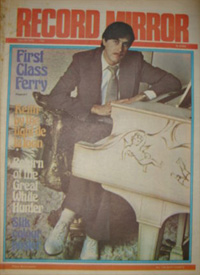 and that is
what they got. and that is
what they got.
German band “KRAAN” gave and expert
demonstration of how you could be exciting and subtle, and
still rock. Their set lived up to all expectations, from
their excellent live double album. They are very tight as
a unit, but still have plenty of room for individual
expression, through wandering solos, which cleverly come
back to the main theme.
It was a great
night for guitarists, and Peter Wolbrandt made his mark,
as did their remarkable bassist, Hellmut Hattler. Perhaps
the crowd couldn’t make out the song titles, but they
understood the music.
Review by David Brown
|
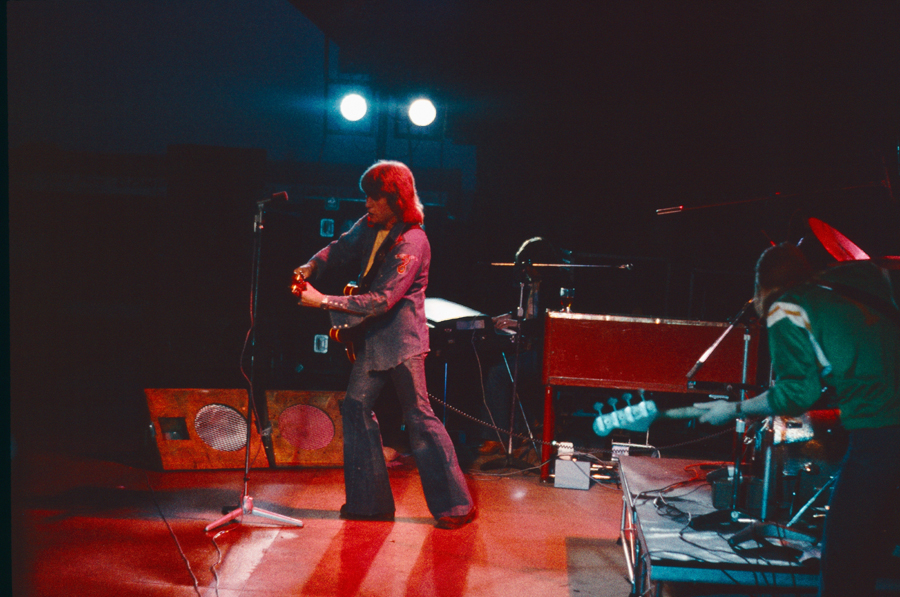
May 31, 1976 - Alvin Lee
Band at Southend Festival
Photo: Steve Potter
|
May 31, 1976 - Southend Festival
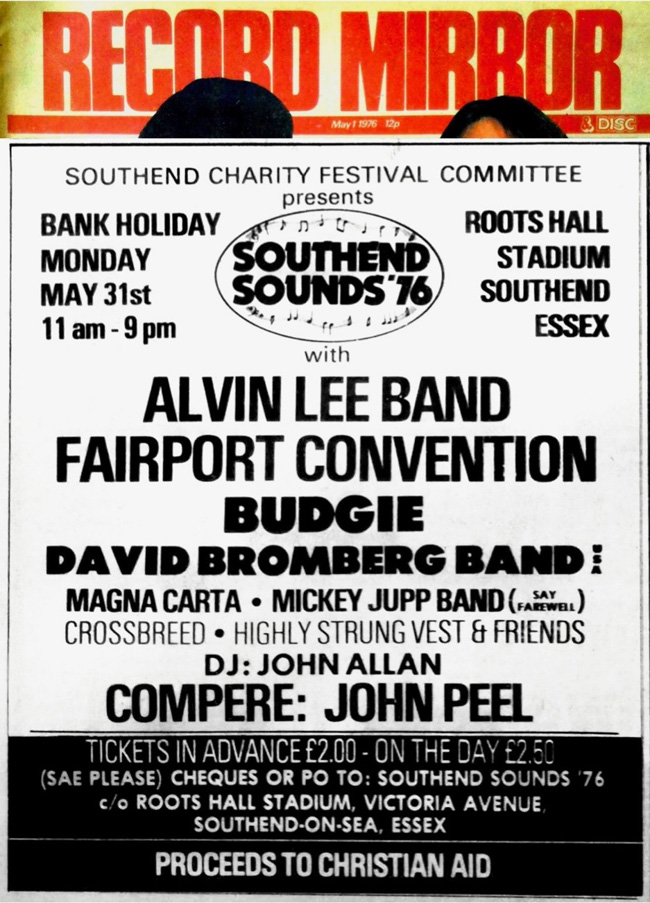
May 1, 1976 - Record
Mirror
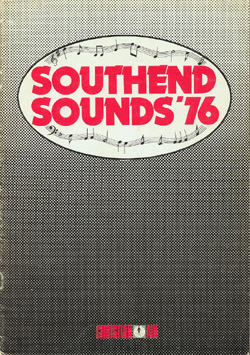
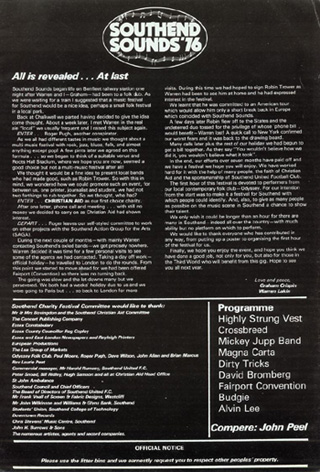
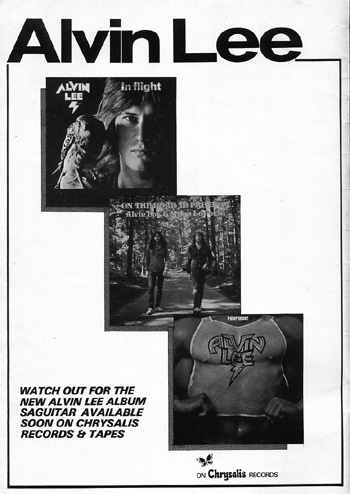
Southend Music Festival 1976:
The growing national
trend to use football stadium’s for music festivals has spread
to Southend, on May 31, 1976, when Roots Hall took on the
Southend Music Festival, that is hosted by Radio 1 Disc Jockey
John Peel. On the music menu, includes such acts as:
Budgie, Fairport
Convention, Alvin Lee Band and The David Bromberg Band. As well as
the farewell performance of Southend’s own Mickey Jupp Band.
Reports say that some 3,000 music fans enjoyed the event.
Southend Sounds 1976, is
the closest that we ever got to a music festival at Roots Hall
Football Ground.
It featured Alvin Lee of Ten Years After fame,
in the top billing slot.
May 31, 1976, The Open
Air Concerts at Southend United Football Ground, England.
Southend:
Colin Burnes – Drums – Colin’s musical career includes playing
to 10,000 people at Southend Football Club on the same bill as
Alvin Lee, Budgie and Fairport Convention. Essex born Colin, has
been involved in the live music scene in East London and Essex
for many years. |
|
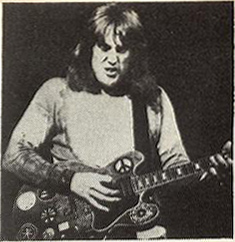
MUSICIAN - June 1976

Alvin
Lee – Has A Problem !
By
Eamonn Percival
Alvin
Lee has got a problem. He may not be aware of it – although
I suspect he is, but he really has to get off his arse and
rock and roll, if he is going to sustain his position in the
ranks of rock’s elite. He’s worked hard to get there, but
he will have to work just as hard to stay there. Over the last
couple of years, he has lost a lot of ground and every week
sees a new “Guitar Super Hero”. Not that he particularly
wants to be a “guitar-super-hero”, he had enough of that
with Ten Years After, but his forte is undoubtedly his six
string dexterity.
Ten
Years After was the band that elevated the name of Alvin Lee
to superstar status. In the early sixties blues boom, it was a
case of the faster you play, the better you are. Alvin learned
to play fast. From “a good band with a fair guitarist” Ten
Years After became “a great guitarist with a fair band”.
The band did particularly well in the States always thirsty
for boogie, and America took Alvin Lee into their hearts and
he came out “A Superstar”. The film Woodstock put the seal
on it. Alvin’s red hot solo on “Going Home” was for many,
the highlight of the film. Ten Years After were now “Big
Business”, but it was the beginning of the end for the band.
Alvin became disillusioned everywhere they played, the
audience wanted to re-live the film. Cries of “Going Home!”
eventually provoked Alvin Lee into returning home to England.
The band split and he retired to his modest
£ 100,000 mansion near
Reading, presumably to “get himself together”. 1973 saw an
album called “On The Road To Freedom” which Alvin recorded
with Mylon Lefevre who was a very powerful gospel singer. It
was a complete change of direction for Alvin, and his new
found independence and renewed enthusiasm culminated in a new
road band, called “Alvin Lee and Company”, which consisted
of Mel Collins (Saxophone) Ian Wallace (Drums) Tim Hinkley
(Keyboards) Alan Spenner (Bass) and Neil Hubbard (Guitar).
With a minimum of rehearsals, the new band performed one
outstanding performance at London’s Rainbow, from which the
“In Flight” double live album was taken. After the
phenomenal success of that gig, Alvin went on to do a world
tour, with a slightly different line up, with Ronnie Leahy
replacing Tim Hinkley and Spenner’s place was taken by Steve
Thompson.
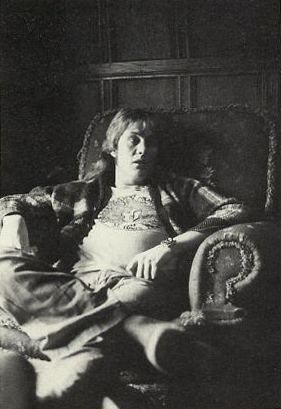
In
the summer of 1975, Alvin dug up Ten Years After for another
American tour. Unfortunately, the tour coincided with the
release of another Alvin Lee solo outing, called “Pump
Iron” It was a fair album, but not strong enough to sell on
its own. With Alvin touring the States, “Pump Iron”
didn’t really live up to expected sales. He returned home
and set about looking for members for yet another band. His
old pal Tim Hinkley was brought in on keyboards, along with
Bryson Graham and Andy Pyle playing drums and bass
respectively. Together, they recorded an album which should be
released in the near future and are now busy rehearsing in
preparation for the road. A trip down the M4 to Reading was
the order of the day. Four in the afternoon found Alvin only
just surfacing, he had been in the studio until eleven that
morning, and after a reviving coffee, we retired to the T.V.
room to conduct the interview. A video recorder, countless
cassettes, a T.V. camera and other playthings littered the
floor, while our hero relaxed in an antique armchair and lit
up the first in a long chain of cigarettes.
Perhaps
Alvin’s lifestyle has something to do with his
“Problem”. Tucked away for most of the year in this
gigantic house, next door to an enormous converted barn,
housing a professional sixteen track recording studio. It’s
a comfortable life for a humble Nottingham lad, perhaps a
little too comfortable. There’s always the temptation to
hibernate for most of the year, and only occasionally popping
across the Atlantic for a short tour with Ten Years &
Company or whoever, eventually returning to Hookend Manor to
escape and recuperate. Of course, there’s always the studio
to keep him occupied at home, but I couldn’t help but
wondering if his sojourns into the studio are really borne out
of a deep desire to be creative or a deeper desire to escape
and relieve the boredom.
With
the new band, however, he seems to have found a brand new
enthusiasm. There is a definite change in direction as he
explained this way: “With the music that I’ve been doing
in the past, I was influenced, like a lot of people, by funk
and soul. The Rainbow gig we did, had
very funky leanings, and the second Alvin Lee and
Company band was sort of jazz / funk.
When
I went out on the road with them, I thought that instead of
being a sort of copy of Cornell Dupree, I should really get
down to doing what I do best. It’s a musician’s trip,
always trying to play above yourself. Playing jazz and things
with more taste, that would be appreciated by other musicians
but that’s about it. When all was said and done, we really
did have a good funky band, but it was nothing like: The
Meters or Kool And The Gang, so it’s all down to getting
back to the Rhythm and Blues roots now. What’s good about it
now is that, previously I got the very best musicians that I
could find, where as now I’ve got a band.
The
four of us are a unit, which is really nice. It’s like the
first three years of Ten Years After. Everybody’s really
into what we’re doing, and it’s a very communal thing”.
Ten
Years After stopped being “fun” for you then?
“Ten
Years After went through that but then lost it. It’s like
the very early days, all over again now. Sometimes we sort of
sit around talking about what we’d like to do for about
three hours. Discussing various records and new directions and
things like that”. The friendship that exists within the
band is very important to Alvin. For the first time in quite a
few years, he is working with friends as well as musicians.
Alvin
continues: “It really is important to a band, and it shows
in the music as well. Like, we’ll be doing a take and it
might not be quite right, so we come in here and sit around
and get our heads together. It’s a whole different thing,
and it just gells”.
When
asked how permanent the band is, Alvin was a trifle hesitant
in replying. “Well,
it’s a permanent as……well, it could well be permanent .
I’m quite optimistic. It’s just a really nice unit to work
with”. Before
they started recording the album, the band had only been
together a matter of weeks.
They
rehearsed the numbers for a week, cut rough versions in the
studio and then took them away for a weekend to “live with
the songs”. When they came back, arrangements were ironed
out and the songs recorded. Alvin says: “It was like the
equivalent of three months on the road. That’s the reason
the whole thing is coming together so quick. It’s like when
you’re on the road and you’re doing a number, and you
think to yourself ”Oh I’d like to put this in here” and
by the end of the set, you’ve forgotten all about it. When
you’ve got it down on tape, you can analyse it in different
moods. And when you record it and listen to it afterwards,
everyone is very critical. It’s an amazing facility really,
having a studio to rehearse and record in”.
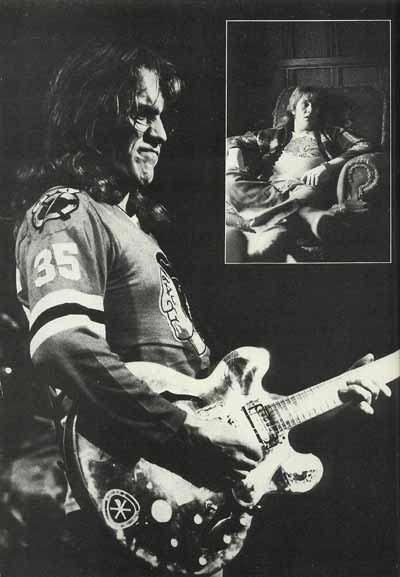
In
keeping with Alvin’s principle of “getting back to the
roots” most of the tracks on the album will be very basic.
He is insistent on not doing too many overdubs. He adds:
“Most of the stuff I really used to get off on didn’t have
eight overdubbed voices or anything like that. The old Elvis
and Jerry Lee Lewis and Little Richard stuff was all done in
just one take, usually. They might have had to do it a load of
times, but when they got it, they really got it. I think
overdubbing really only helps if your basic track is weak.
What we found is with the tracks we’ve done, overdubbing
just doesn’t fit because the basic tracks are good. Unless
you’re super careful, you tend to cross whatever is already
happening. You can very easily go too far, and it can happen a
lot with multi-tracking too.”
Alvin
tells me that he’s co-producing the album with Chris Kimsey.
The partnership goes back a long time, to the days when Chris
was engineer at Olympic Studios and he worked on three Ten
Years After albums. It is the first time Alvin has used
another producer, and he’s very pleased with the results.
Alvin adds: “He’s really good, and it really helps. It’s
like having a really attentive ear in the studio. It sounds
very different up there in the control room. You can get too
close if you’re producing yourself. Like, I might play a
part on the guitar and think to myself “Yeah, that’s the
one” and Chris will say no, that’s not right, and then
sometimes I’ll do a bit and think to myself: “No that
wasn’t right” and Chris will like it. A mistake you might
try to bluff out of sometimes, turn out to be the best licks.
It’s just because if you didn’t do what you intended to
do, you think it’s wrong”.
On
most of the basic tracks, Alvin sticks to his old Gibson
ES-335 Guitar, although he sometimes uses a Telecaster or a
Stratocaster and various acoustics. He also finds that when he
changes a guitar, his playing style alters accordingly. “I
picked up a really old Stratocaster in Texas. It’s a
beautiful guitar, one of those that seem to play itself. The
notes sound so nice, you don’t have to play a lot. With my
stage Gibson, I use a very heavy bottom E string so that if
I’m playing up high, I can whang down on the bottom string
and it sounds like a grand piano. Where as if you do that with
a Les Paul or a Strat, it just doesn’t happen because the
note just bends away. Also, on the Gibson, I’ve got heavy
gauge Gibson strings for the E,A and D and then the top three
are light gauge Fender Rock and Rolls, because they’re the
one that I bend. That came about by accident really. I was in
the States, and I used to use fairly heavy strings, but I cut
my finger once and decided to put light gauge strings on the
top, so they were easier to bend. Since then, I’ve just got
used to that set-up”.
Apart
from his own band, Alvin recently became involved with an
outfit called FBI (Funky Blues Incorporated – 1976) Just
over a year ago, Alvin was watching T.V. when he spotted them
playing on a children’s show. At the time the band had been
slogging around the London pub circuit and getting nowhere
fast, but Alvin liked them and offered to lend a hand. He
invited them over to his studio and with Chris Kimsey, they
both helped to get their sound down on tape. Their first album
was recently completed at the studio, (Space-Studio) and Alvin
is still very much involved with them. Alvin says: “We’ve
been having a bit of trouble getting them the right set up.
They’re going to go with me on the tour, and it will be a
bit different for them, having to play to a seated audience.
They’re basically a club band. They’re great at somewhere
like Dingwalls, but they need experience playing concerts.
The
trouble with looking after a band a band like that is from the
business angle. I’m not a great businessman. Warner’s
wanted the band right from the get-go. They heard the demos we
did and they said, “Great” so we worked out a deal and
everything. Then with my lack of business knowledge, I told
everyone else who were interested in them that it was off and
that we were going with Warner Brothers. “A few days before
it was all signed, sealed and delivered,
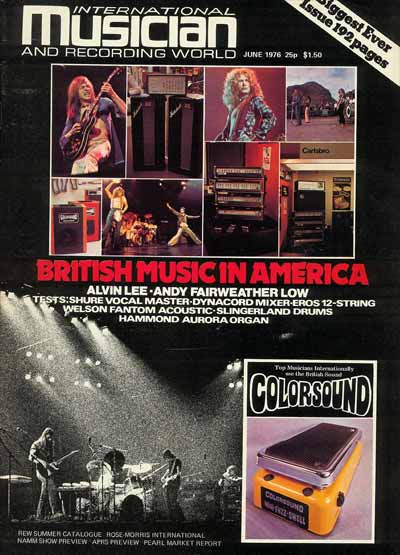 Warner Brothers
called the whole deal off – they had cut-backs and closed
some of their offices and even dropped some of their artists.
By that time, I’d blown it with everyone else. Now, we’ve
got Polydor really raving about the band in Europe, and the
guy in England doesn’t like it. We almost had a deal in
England tied up, but the guy wanted the option for America too,
which was totally ludicrous, because they were going to see if
it sold in England first, and then release it in America six
months later. Well, ideally I wanted it out at the same time.
So I’ve given up trying to be a businessman. It started to
affect me. I wasn’t playing any music. Some people can get
into all that, but I’m not inclined that way. I mean, I’d
get stoned and go into a meeting and tell them exactly what I
thought and what I wanted to do, and that’s not the sort of
thing to do in the business world” ! Warner Brothers
called the whole deal off – they had cut-backs and closed
some of their offices and even dropped some of their artists.
By that time, I’d blown it with everyone else. Now, we’ve
got Polydor really raving about the band in Europe, and the
guy in England doesn’t like it. We almost had a deal in
England tied up, but the guy wanted the option for America too,
which was totally ludicrous, because they were going to see if
it sold in England first, and then release it in America six
months later. Well, ideally I wanted it out at the same time.
So I’ve given up trying to be a businessman. It started to
affect me. I wasn’t playing any music. Some people can get
into all that, but I’m not inclined that way. I mean, I’d
get stoned and go into a meeting and tell them exactly what I
thought and what I wanted to do, and that’s not the sort of
thing to do in the business world” !
After
a month long British Tour, Alvin will go to the States in late
August, although it’s doubtful that FBI will support him on
the American jaunt. He says: I’d like to take them with me,
but it could cost a lot of money. They’re a nine piece band,
and with hotels and plane fares alone, it could be quite
expensive. “Naturally, after his problems with Ten Years
After in the States, Alvin hasn’t set his sights firmly on
the USA. The question remains then, where does he see the
bands future?
“Well, I don’t look at it like that. It’s
really seated in the music. If the music’s good, then
we’ll go anywhere”.
|
|
June 6,
1976 – Sunrise Festival – Offenburg, Germany
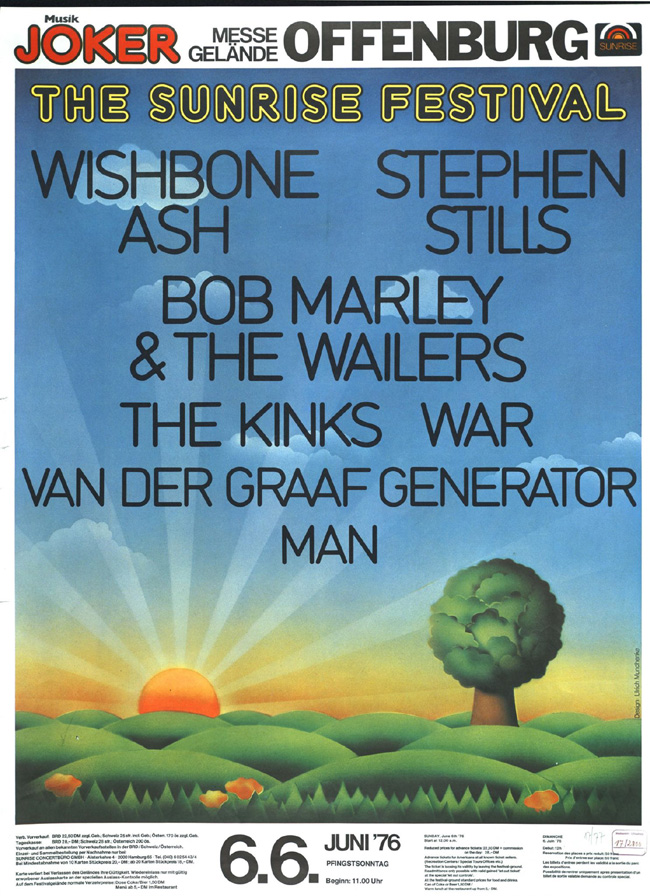
On the bill are: Van
DeGraaf Generator – Man – War – Procol Harum – Wishbone Ash
Bob Marley and The
Wailers – The Scorpions – Stephen Stills – The Kinks – Barclay
James Harvest – Little Feat and
The Alvin Lee Band: Alvin’s set
list: Gonna Turn You On – Friday The 13th – Midnight
Special – Ain’t Nothin´ Shakin´- The Devil’s Screaming – and one
ten minute untitled song (I’m Going Home was the song).
The Alvin Lee Band made a surprise last minute appearance.
The concert
misinformation first listed Ten Years After as playing here, but in
truth, it’s “The Alvin Lee Band” as Ten Years After separated in
1974.
Richard E. Kesel says of
the festival, with the distance of thirty-five year span in
between, “of course everyone was relieved when it was around,
not to mention all the smoke, and being ankle deep in garbage”.
However, vibrate with a bit of satisfaction, that it has
remained in spite of all the prophecies of doom, a largely
peaceful rock concert, that is still talked about decades later.
It was an Open Air Festival that took place at the Offenburger
inlet, where a reported 18,000 people attended, paying twenty DM
per ticket. Good times back then.
It was referred to as a
“Festival of Friendship”. Also there was Tony Prince, who was
the chief spokesman for Radio Luxemburg, working from the
Offenburg Festival. It should also be noted, that this festival
occurred on Pentecostal Sunday. People started arriving with
tents, sleeping bags, cooking pots and pans, cooking stoves,
aprons, packets of soup and with guitars in hand. Individually,
the audience members represented, The U.S.A. – Germany – The
Netherlands – England – Brussels – Spain……you name it, these
thousands of rock disciples of, most dressed in adventurous
nomad like clothing, in light summer attire.
To put it into context,
1976 was the year disco overruled all other music – “Grease”
(the movie and the Bee-Gees soundtrack) was in, and rock was
out. It was now seven years after the historic Woodstock 1969
Festival and the Hippie Trial was now stone cold at best.
But this event, was no
doubt, the loudest Pentecostal concert that the residents of
Offenburg would be witness to. The largest open air rock
festival ever held in this quiet community, even regarded as
world-class. With an abundance of musicians who were among the
best to ever come out of our generation – talkin´ bout my
generation! Or that era of rock and roll.
The Offenburg
Fairgrounds saw: The Alvin Lee Band, Procol Harum, War, Man,
Wishbone Ash, Van DeGraff Generator, The Scorpions and Bob
Marley. Offenburg was always a good time for a pop or rock
concert I’m told.
The hard rocking sounds
of Alvin Lee, was for many the highlight of the event. The
greatest fastest paced guitarist of Ten Years After fame, now
out to prove himself all over again, with his own band. He
performed “I’m Going Home” to perfection, and to thunderous
applause.
The “Scorpions” attacked
the guitar strings, followed by Europe’s champions league “Man”.
The quintet from Wales.
Procol Harum went on, and who among us doesn’t know their hit
song of the day, “A Whiter Shade Of Pale” ! Followed by Wishbone
Ash, who were well known for such titles as, “Rock and Roll
Widow” and “The King Will Come”.
The Face Down Side:
It was stated, that the
festival should be completed by 22-clock (10:00 PM). By 23:15
(11:15) clock, the time completely ran out, and at the behest of
the police lights ablaze and pulling the electrical plug on Bob
Marley’s performance. Bob took it all in his usual stride,
because he otherwise would’ve been neglected entirely and he
realized that, saying – “everything will be alright, we will win
in the end, because the truth is on our side. Then Germany will
be dancing to the truth, and the truth is Reggae. Bob returned
to his cabin and had made a giant joint. “That’s the system,
never mind said Marley, everything will be alright in the end”.
But Bob never lived to see that day come, as he died on May 11,
1981.
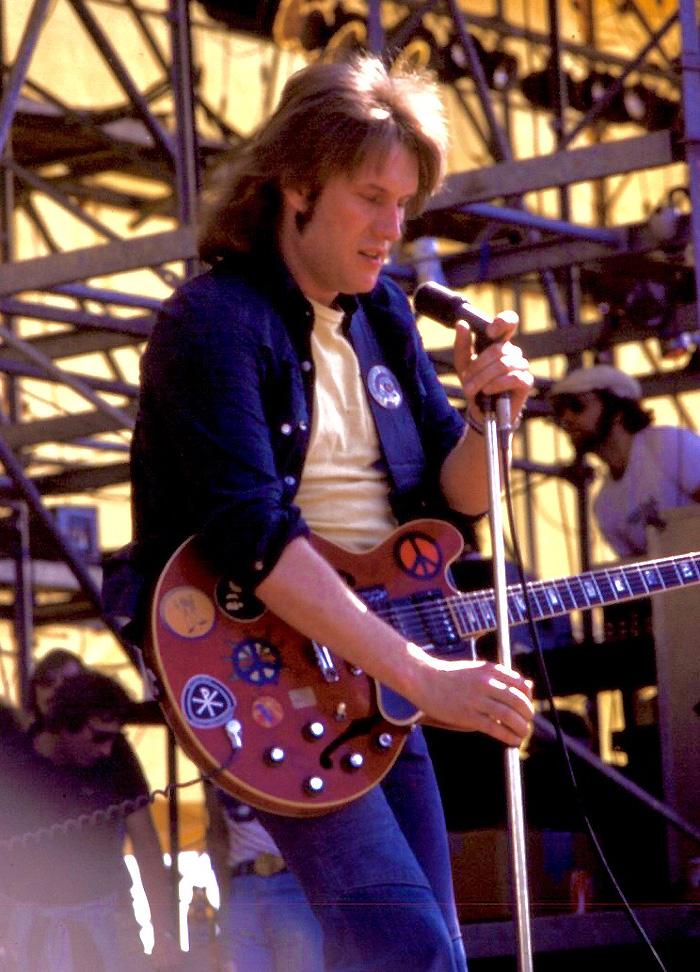
Alvin Lee at
the Sunrise Festival - Photographer: Peter Nath
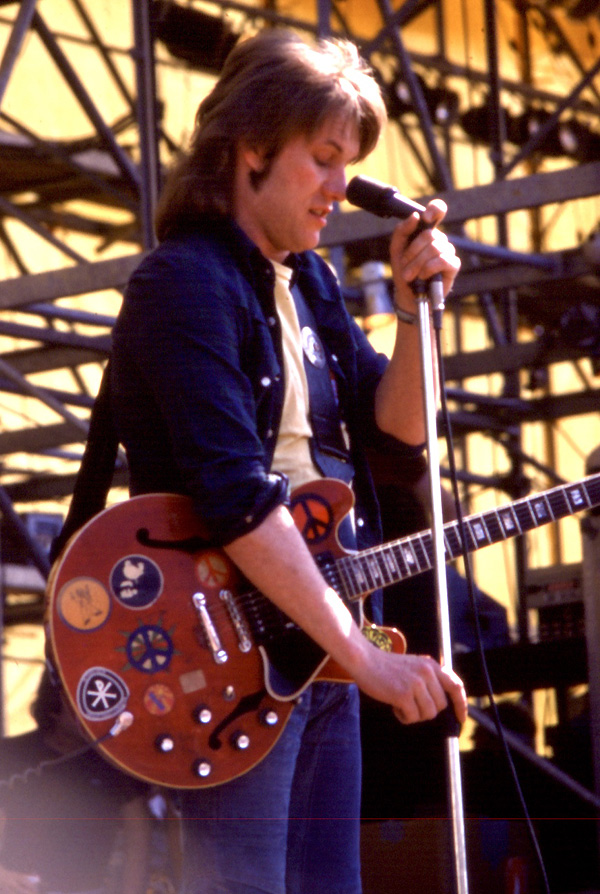
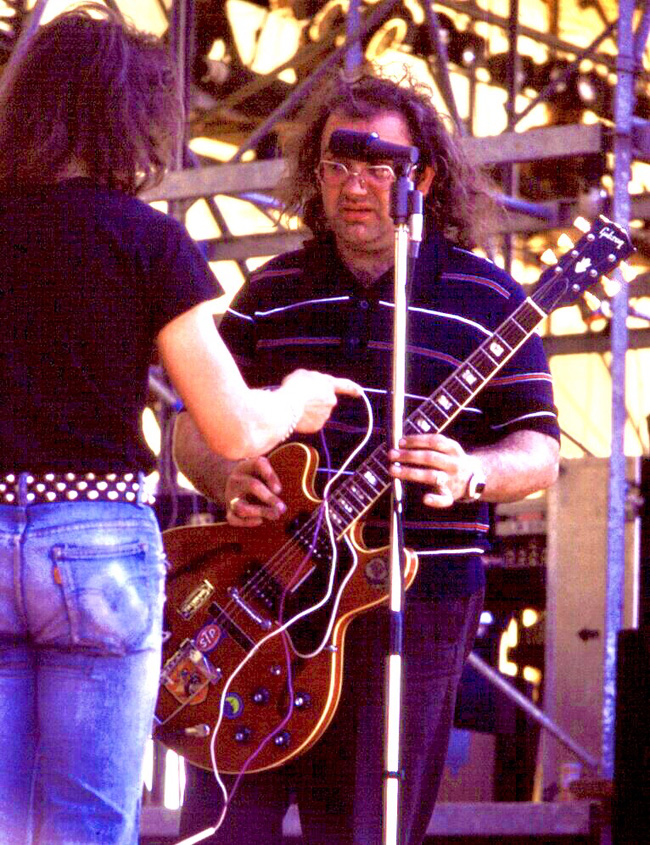
John Hembrow with Alvin's second
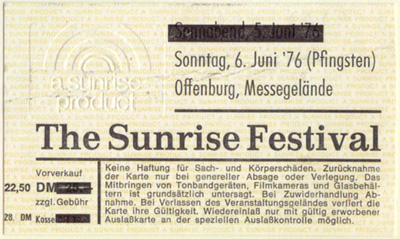
| Review by German Fan Herbert
who attended the concert War damals dort. Das Wetter war
ausgezeichnet, viele bekamen richtige Sonnenbrände. Ca.
15.000 Besucher waren da. Leider auch viel Polizei mit
schrecklichen Kontrollen am Eingang zum Messegelände.
Interessant war, dass 2 Bühnen nebeneinander aufgebaut waren
und die Bands abwechselnd rechts und links spielten mit
relativ kurzen Umbauzeiten. Leider musste man um gut sehen
zu können dann auch ständig den Platz vor einer Bühne zur
anderen wechseln, was zu einer ziemlichen Unruhe auf dem
Gelände führte. Begonnen hat das ganze pünktlich um 11.00h
mit der Stuttgarter Band SPATZENSTRULL. Dann spielten die
SCORPIONS als kurzfristiger Ersatz für die KINKS, die wegen
Krankheit von Ray Davies nicht kommen konnten. Es kam aber
der Drummer der Kinks Mick Avory auf die Bühne und
entschuldigte die Band. Es spielte dann am frühen Nachmittag
VAN DER GRAAF GENERATOR. Dann MAN und ALVIN LEE & Co (nicht
Ten Years Later, die spielten erst beim Rockpalast Festival
in Essen und das war 1978). Am späten Nachmittag kamen WAR
ohne Eric Burdon und bei Sonnenuntergang in schönster
Abendstimmung PROCOL HARUM. Am Abend waren dann WISHBONE ASH
dran, der Höhepunkt des Festivals für die meisten Besucher.
Die Besonderheit war, dass mitten im Set Wasser vom Zeltdach
der Bühne in die Verstärker lief, was zu einer Unterbrechung
des Konzertes führte. STEPHEN STILLS war auf dem Plakat
angekündigt, kam aber nicht. Dafür spielten unangekündigt
BOB MARLEY & THE WAILERS ab ca. 22.00h. Soweit ich weiss war
das das erste Konzert von Bob Marley in Europa überhaupt.
Bin dann allerdings gegangen, weil mich Bob Marley damals
nicht sonderlich interessierte, was viele andere Besucher
auch taten und das Gelände sich um diese Zeit schon ziemlich
leerte. Wie ich später hörte wurde Bob Marley um 23.20h der
Strom abgeschaltet, weil sich Anwohner wegen der Lautstärke
beschwert hatten. Ansonsten spielte da allerdings niemand
mehr, weder Little Feat noch Barkley James Harvest.
Insgesamt fand ich das Festival als sehr gelungen, die
Stimmung war gut und vor allem das Wetter ausgezeichnet.
Erinnern kann ich mich auch noch an die ständigen
Blechdosenschlachten, weil die Leute zwischen den Bühnen hin
und her liefen und die Sicht verstellten, was viele zum
Dosenwerfen animierte. Interessanterweise hatte der
Veranstalter wegen der Änderungen im Programm am frühen
Morgen ein Info-Blatt an die Besucher verteilen lassen, das
den tatsächlichen Ablauf des Tages erläuterte und die
Änderungen entschuldigte.
The following review by Werner:
- Kinks sind wegen Krankheit ausgefallen,
- bei Alvin Lee stand plötzlich die ganze Meute
auf und versperrte allen, die so schön auf der Wiese lagen,
die Sicht.
- Scorpions legten ein super Konzert hin.
- Procol Harum war auch erstaunlich stark.
- Bob Marley war noch nicht so bekannt, hat mir persönlich
auch nicht so gut gefallen.
Die Stimmung war Abends allerdings ganz toll,
dieses Konzert und den Sonnenbrand werde ich nicht vergessen.
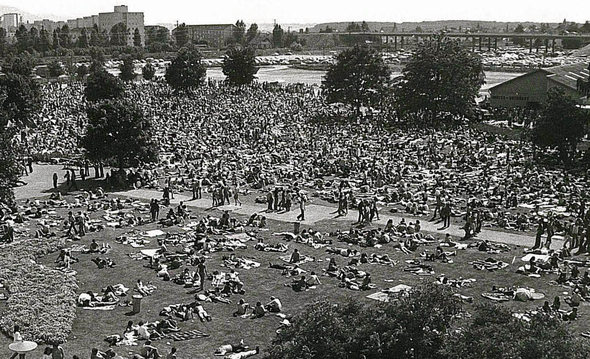
|
|
September 1976 - POPULAR 1 Magazine,
Spain
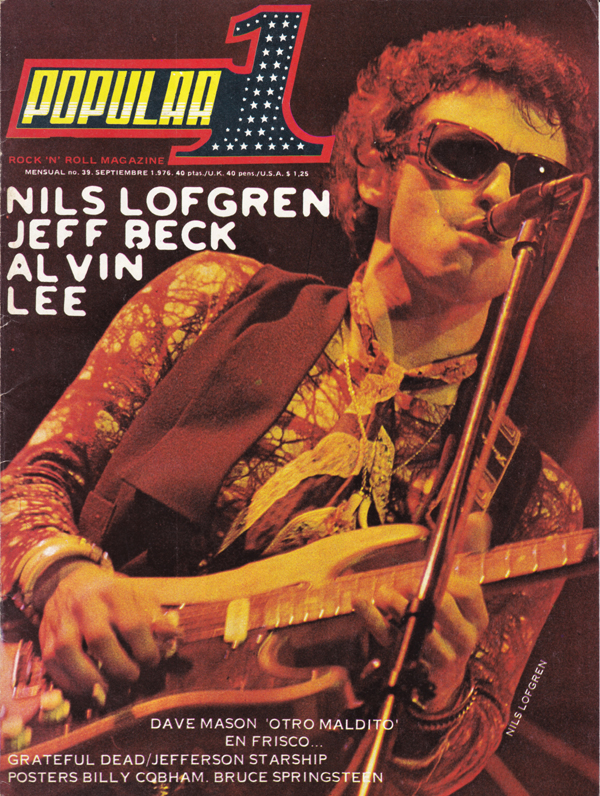
Front Page
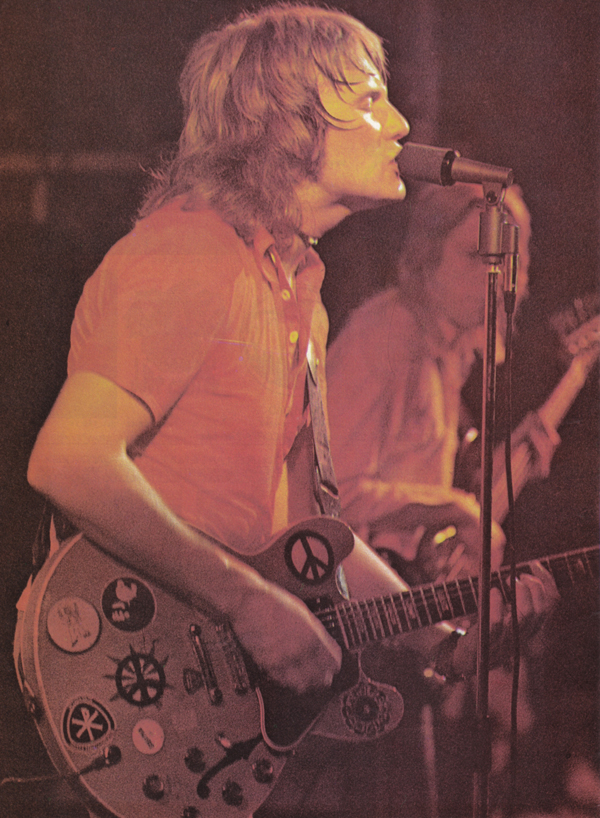
page 12
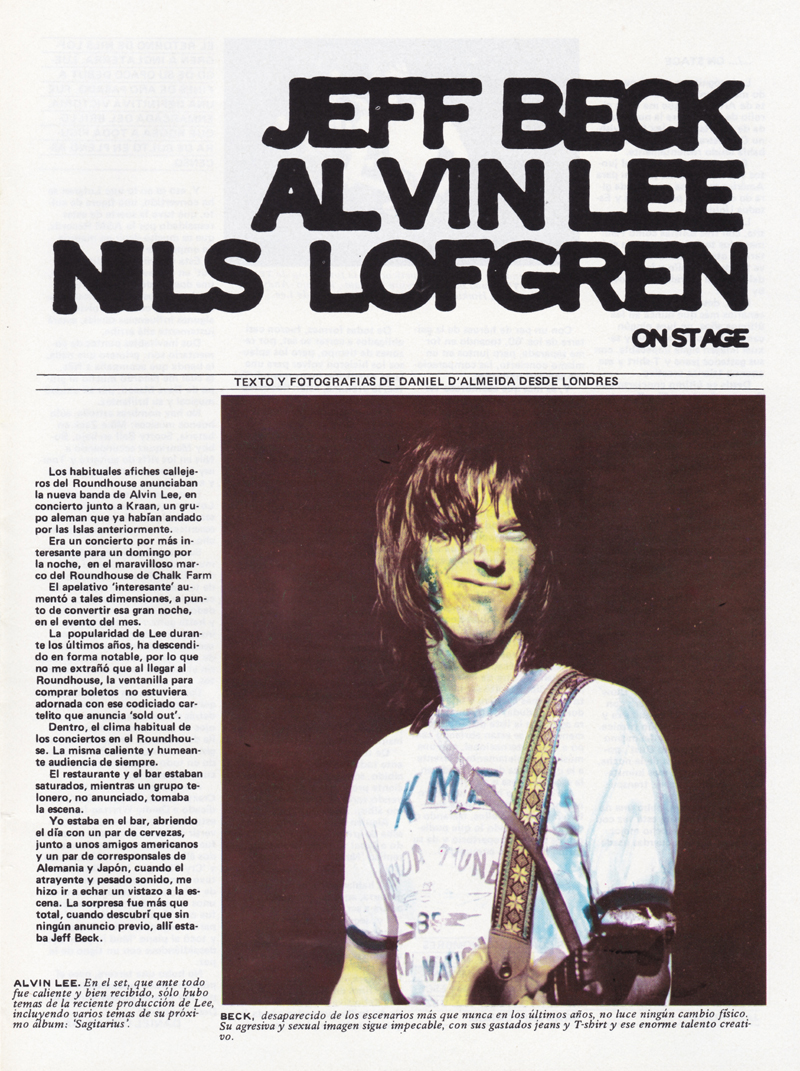
page 13
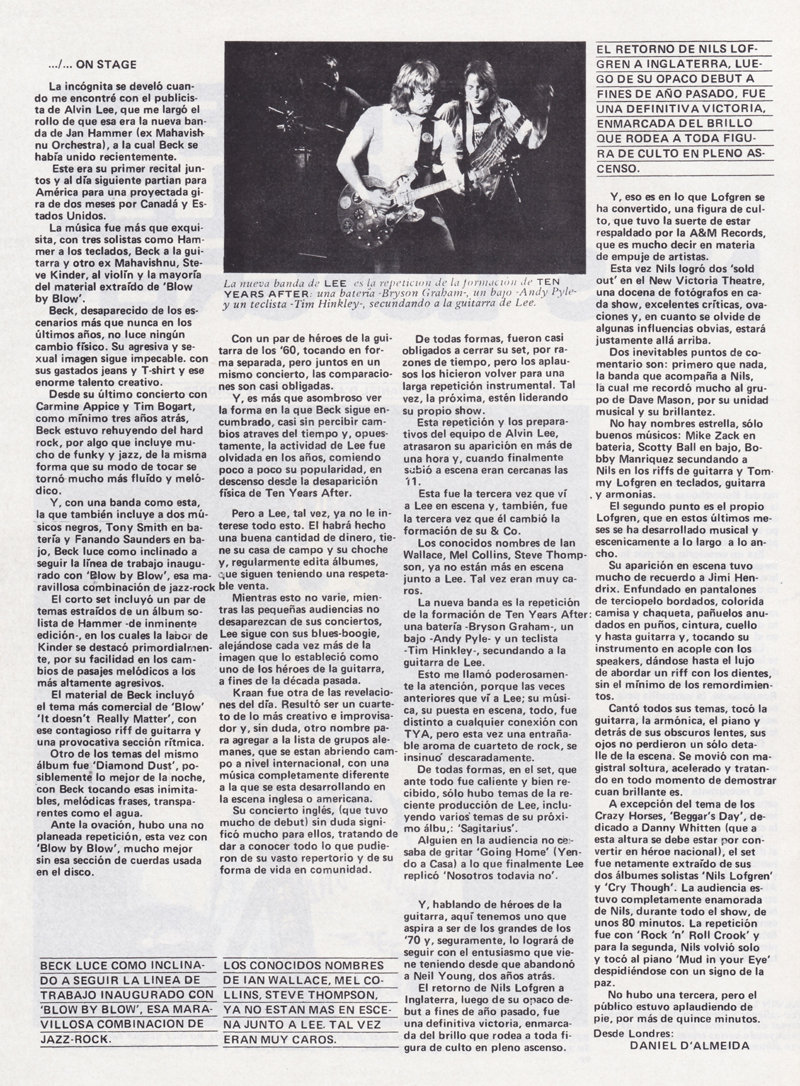
page 14
|
November 1976 - POPULAR
1
Magazine, Spain
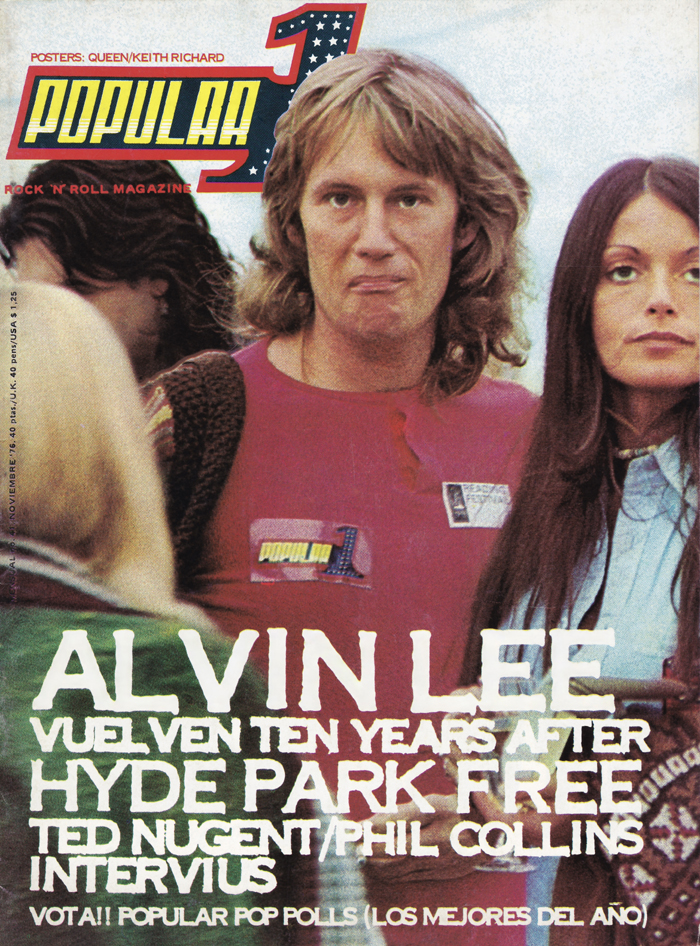
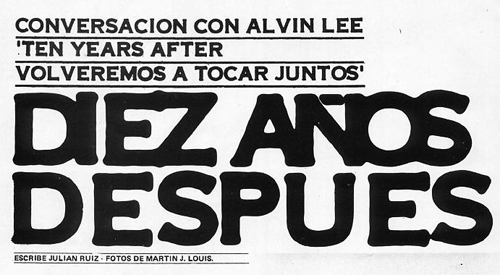
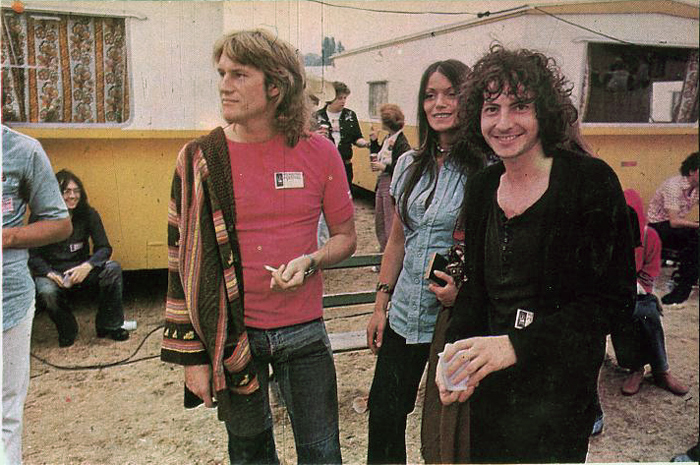
Alvin Lee & Suzanne
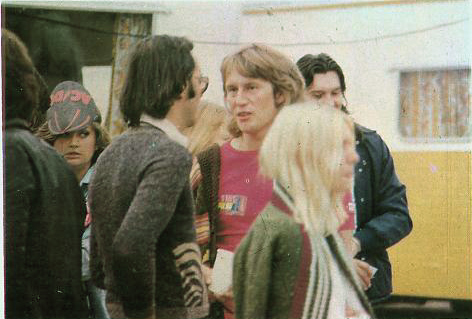
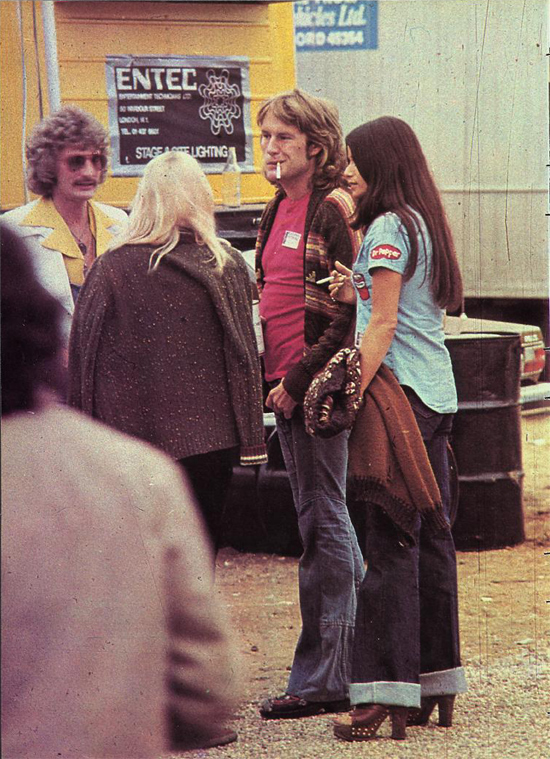
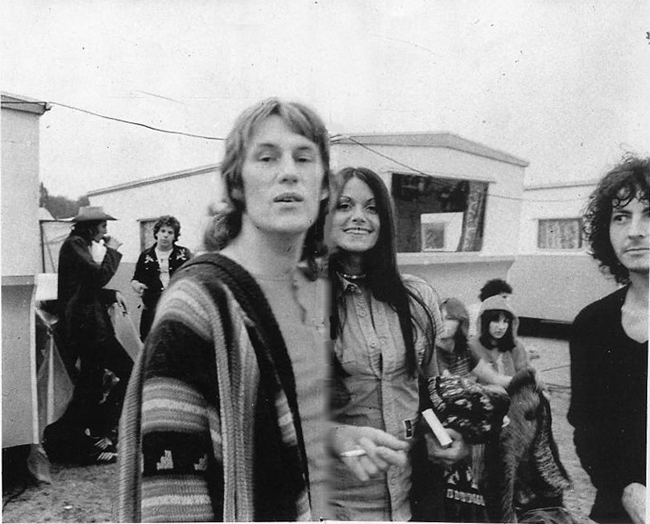
|
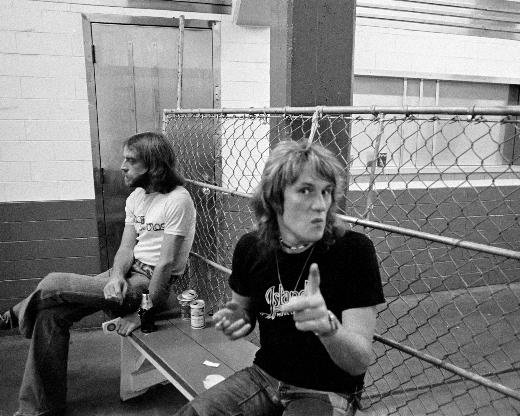
Don't stop here - click to the next page
|